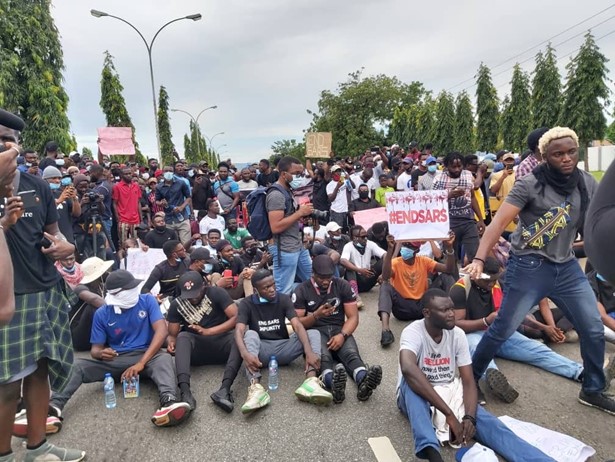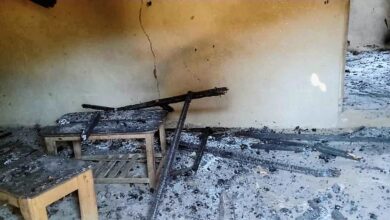Day 3: Abuja #EndSARs Protesters Dispersed With Force Again

On day three of protests in Abuja, Nigeria’s Capital City, police officers have deployed the use of teargas, water cannons and warning shots to disperse protesters.
On Sunday morning, citizens who braced for a peaceful protest were forcibly sent out of Unity Fountain where they converged.
Residents had embarked on the third day of protests, joining a national call for an end to the Special Anti-Robbery Squad (SARS)
The squad, under the Force Criminal Investigation and Intelligence Department, was created to curb violent crimes such as armed robbery but SARS has become notorious for moving around in casual wears, unmarked cars and conducting extrajudicial killings, detention and brutality.
On Friday, protesters were dispersed hours into the protest with volleys of teargas barely an hour into the protest.
The protesters regrouped in larger numbers on Saturday and walked for miles across the city before camping at the Nigerian police Headquarters.
HumAngle monitored the peaceful protest as citizens made their way through Aminu Kano crescent and Aguiyi Ironsi street Maitama chanting “#ENDSARS”.
Protesters stopped at a road intersection and took a knee for victims of police impunity and human rights violations.
Multiple cars were also flanking the group, as people around watched, observed and chanted in support of the movement.
While approaching the National Communication Commission Headquarters, Nigeria’s domestic intelligence team (State security services) on sportbikes appeared on the other side of the road before they zoomed off, a tactic that was likely meant to notify the protesters of their presence.
Minutes later, protesters arrived at the Unity Fountain, a space that has become famous as a staging area for civic engagement and movements.
After a period of back and forth, protesters decided to walk through Shehu Shagari way to protest at the police headquarters.
They were received by different units of the police armed with assault rifles and teargas.
Attempts were made by the police to speak and persuade them to return home, but this effort did not work, as protesters maintained their demands including seeing the Inspector General of Police.
Volunteers moved around distributing water, food and tissue papers, while others followed up and picked up the waste.
Around 4 p.m., the police were seen receiving briefing and subsequently, a team with tear gas guns took up frontline positions for what appeared to be an imminent action to disperse the protesters.
This action led to protesters forming a wall and they began live streaming their situation.
They chanted songs of defiance and continued to demand the scrapping of SARS by the government.
Moments later, two senior police officers Aisha A. Yusuf and Emega John tried to persuade the protesters to leave but they remained defiant.
The situation was soon de-escalated and protesters continued to play songs and dance.
As the sunlight began to fade, protesters started preparing for support systems to facilitate their plan to sit out through the night until their demands are met.
Around 7 p.m., the police officer Aisha A. Yusuf tried again to tell protesters to return home but they remained defiant.
Minutes after, she returned to her colleagues and soon, volleys of teargas were fired and pepper spray guns deployed directly at protesters.
Multiple sounds were heard and spark from the guns was visible in the darkness. Water Cannon Trucks were also deployed to disperse the protesters.
Attempts to return were responded to with volleys of teargas. Protesters who later returned to their cars parked opposite the headquarters found their tyres with deep knives cuts.
Unshaken, protesters have begun assembling on Sunday and are prepared to move again to the police headquarters.
Support Our Journalism
There are millions of ordinary people affected by conflict in Africa whose stories are missing in the mainstream media. HumAngle is determined to tell those challenging and under-reported stories, hoping that the people impacted by these conflicts will find the safety and security they deserve.
To ensure that we continue to provide public service coverage, we have a small favour to ask you. We want you to be part of our journalistic endeavour by contributing a token to us.
Your donation will further promote a robust, free, and independent media.
Donate Here




